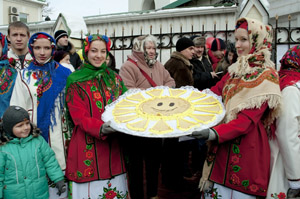Celebration of Blini Day (Maslenitsa) in Russia

Carnival, Mardi Gras, Fat Tuesday, Maslenitsa - whatever the name, these are all the same late-winter festival of eating, drinking and merrymaking.
As with many holidays, Maslenitsa has a dual ancestry; pagan and Christian. On the pagan side, Maslenitsa is a sun-festival - the sun is shining longer and warmer each day, and winter is clearly on its way out--surely a cause for celebration!
On the Christian side, Maslenitsa marks the last week before the onset of Lent (the period of fasting which precedes Easter). Already, as a sort of warming up exercise, Orthodox Christians are abstaining from meat. Once Lent itself begins, a strictly kept fast excludes meat, fish, dairy products and eggs. Even vegetable oil is doled out sparingly.
Furthermore, a strictly kept Lent excludes parties, secular music, dancing and other distractions from the spiritual life. So Maslenitsa represents the last chance for a good fling with worldly delights - another good cause for celebration.
Both sides of Maslenitsa's family tree are evident in that essential element, the bliny. These buttery pancakes are as round and golden as the sun, and are made from the rich foods still allowed--butter, eggs, and milk. Besides making and eating quantities of bliny, a Russian old-time Maslenitsa might include masquerades, snowball fights, sledding, swinging on swings and plenty of sleigh rides -- the sleighs tracing a semi-circular path across the snow, like the sun's path across the sky.
Work would come to a halt, as people threw themselves into partying, visiting, eating and drinking. In some regions, each day of Maslenitsa had its special activity: one day for sleigh-riding, another for sons-in-law to visit mothers-in-law, another day for godparents and godchildren to visit each other. On Friday the young people might take a gaily- dressed straw effigy of "Lady Maslenitsa" to the sledding hill for a day of sliding, and on Saturday all would escort her through the village streets with songs and drinking, "to make the flax grow tall".
As befits a sun festival, fire provides the final glorious moment. On Sunday evening, Lady Maslenitsa is paraded to the edge of the village, stripped of her finery, and consigned to the flames of a bonfire. Any bliny which have escaped thus far are also thrown on the fire, for once Lady Maslenitsa is reduced to ashes, and the ashes buried in the snow, Lent has begun. As the song says: Wednesday and Friday Maslenitsa's gone away. Lent sneaked up behind her and pulled off her tail.
At the end of February all Russian people celebrate Maslenitsa - the holiday of saying good by to Winter. Of all Russian holidays Maslenitsa is the oldest. Until the 14th century Russians celebrated the New Year in March. So it was natural to see the Old Year off at the end of February. Maslenitsa celebration continues for one week. Every day of this festive week has its name and its meaning.
Monday is called "vstrecha" (meeting) because this day Russians are "seeing in" the holiday. From early morning women cook pancakes that symbolize spring sun. Then children and adults alike go outside with songs and dances. They carry a tree decorated with bells and colored ribbons. Then the symbol of winter - Maslenitsa - would be installed on the sleds pulled by ten or more horses. There would be a horse rider on every horse with a broom in his hands. The horse riders would symbolically sweep out cold winter.
Tuesday is called "zaigrysh" (pre-play). It is the start of Maslenitsa games. Wednesday is calld "lakomka" (sweets lover), Thursday is "razguliay" (play until you drop). During these days Russians build snow fortresses and play snow ball battles. On Friday and Saturday they traditionally visit each other. Pancakes on the tables would be a must in every house on these days. Sunday is called "proschanie" (farewell). That is the day to say good by to Maslenitsa and traditionally it is an opportunity to ask relatives and friends for forgiveness. Then everybody would forgive each other and burn Maslenitsa -- a scarecrow of the winter. This would symbolize the wish that the departing winter would take people's old problems and burn them the fire.